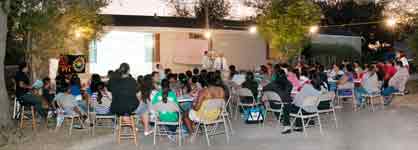• by Hector Bojorquez and Aurelio M. Montemayor, M.Ed. • IDRA Newsletter • March 2012

It was a mild October evening, so the meeting was held outside in the yard in part of the gravel driveway and the lawn between the main house and a guest double mobile home. The screen was a sheet hung on the mobile home wall. Tables and chairs for 80 were set out and filled as the evening progressed. Hot dogs were the main item on the menu. The bulk of the attendees spanned sixth graders through freshmen in college. All of them had some connection to ARISE, some had been volunteers in the summer program and others were children of PTA Comunitario members.

This group of young people had been brought together to be part of the IDRA’s Fair Funding Now! initiative, which has informed community leaders across the state about the state’s draconian cuts to education (see Posner, 2012). This particular event was intended to engage those who are directly affected by the state’s actions: our youth.
The success of this event did not take place in a vacuum but is a result of the host organization’s long-standing tradition of engaging community youth as leaders in their own right. ARISE, a community-based organization in the
Rio Grande Valley, has developed the leadership skills of Valley youth as an expression of their asset-based philosophy that banks on the gifts and talents of every one of its members, always including local youth.
IDRA has played a pivotal role in guiding ARISE leadership to carry out projects that develop or leverage student leaders. IDRA assisted with a self-named Youth Tekie group that staffed a community technology center. Tekies trained parents on technology skills and disseminated information on school accountability through IDRA’s OurSchool portal and the Texas Education Agency’s AEIS databases (Bojorquez, 2010; Montemayor, 2006). That effort revealed that students were highly aware about the Texas’ accountability system, standardized tests, college admissions exams and the effects of testing on their schools. Young people who often saw themselves as mediocre or bad students demonstrated nuanced perceptions about such issues as the disparity of how well the school performed on the state-required test compared to the very few students who were actually prepared for college as assessed by the ACT/SAT.
IDRA and ARISE acknowledge, encourage and position all students, regardless of academic standing, to participate in a wide spectrum of leadership roles. It is a shared core belief of both organizations that youth leadership is an untapped yet fundamental resource. We have witnessed the sophisticated insights students bring to the table, and IDRA through ARISE continuously brings educational information to Valley youth. We gathered these students, because of our belief in them and to involve them in what is one of the most important issues in Texas education: the school funding crisis.
On this October night, the microphone was handed over to the crowd of more than 80 students so that they could introduce themselves and share comments. Students represented several school districts, mostly form Donna ISD and Pharr-San Juan-Alamo ISD. They identified themselves as great students or so-so academically, but all knew they were an essential part of the process. They listened intently to a highly technical presentation – remarkable considering their ages and how schools generally perceive these students.
Students, just as their adult counterparts, were informed the following:
- $6.4 billion was cut from Texas education;
- Classrooms in property poor school districts lost about $26,000 more than wealthier districts;
- No money was provided for educating new students;
- No solutions were given by the state;
- The emergency funds available were not touched in spite of the very obvious need;
- No increased collection of funds was planned in a state that is the second wealthiest in the country and 47th in amount of taxation.
Students were taken to IDRA’s Fair Funding Now! website (http://budurl.com/IDRAfairfund) where they were shown the extent of the cuts in their counties and districts. Students were unanimously shocked and dismayed.
Their testimonies and questions speak for themselves:
- “Is this why Mrs. ____ and Mr. _____ are no longer at school?”
- “There are no more tutoring sessions before or after school.”
- “The bus leaves us at the end of the street.” [This meant that the bus was leaving students at the neighborhood’s entrance rather than near their homes.]
- “Teachers are buying papers and pencils.”
- “We don’t have science experiments anymore.”
- “Our teacher bought the animals for dissection this year.”
- “Is this why Coach ____ is teaching algebra this year?”
- “Is this going to get worse?”
The presenters continued to probe about their school situations. More questions and stories spilled out, “Will things stay like this?” “What can we do?” The presenters then guided the students to an online crowdmap where stories are being collected across the state. They were challenged to enter their testimonies for themselves and to help the adults in their families to report the challenges that their local schools were facing. The students also committed to share what they learned with their peers and families.
In the poem, “The Leaden Eyed,” Vachel Lindsay states: “Let not young souls be smothered out before they do quaint deeds and fully flaunt their pride.” The second line of the poem is: “It is the world’s one crime its babes grow dull; its poor are limp, ox-like and leaden-eyed.” These youth, these families care very much about their education. They are neither dull nor limp, they are ready for deeds based on actionable knowledge. They know money really does make a difference for quality education. And they know they have a voice in what happens next.
Resources
Bojorquez, H. “Supporting the Dream of Going to College Through Powerful Student Engagement,” IDRA Newsletter (San Antonio, Texas: Intercultural Development Research Association, March 2010).
Montemayor, A.M. “E-ruption! Bridging Language and Technology – Educational Leadership Across Generations,” IDRA Newsletter (San Antonio, Texas: Intercultural Development Research Association, March 2006).
Posner, L. “Fair Funding Now! Building Grassroots Leadership for Funding Equity,” IDRA Newsletter (San Antonio, Texas: Intercultural Development Research Association, January 2012).
Hector Bojorquez is an education associate in IDRA Field Services. Aurelio M. Montemayor, M.Ed., is a senior education associate in IDRA Field Services. Comments and questions may be directed to them via e-mail at feedback@idra.org.
[©2012, IDRA. This article originally appeared in the March 2012 IDRA Newsletter by the Intercultural Development Research Association. Permission to reproduce this article is granted provided the article is reprinted in its entirety and proper credit is given to IDRA and the author.]



